| (insert your NIE or newspaper logo here) |
Weekly Online LessonOnline Lesson ArchiveGrade Level: 6-12
|
Facing War
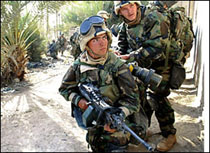 No bigger news story than the launching of Operation Iraqi Freedom hit the headlines last week, kicked off with images of U.S. military strikes in Baghdad. Within the hour, on March 19, 2002, President George W. Bush announced that American and coalition forces were "in the early stages of military operations to disarm Iraq, to free its people and to defend the world from grave danger."
No bigger news story than the launching of Operation Iraqi Freedom hit the headlines last week, kicked off with images of U.S. military strikes in Baghdad. Within the hour, on March 19, 2002, President George W. Bush announced that American and coalition forces were "in the early stages of military operations to disarm Iraq, to free its people and to defend the world from grave danger."
Although preparations for this war began weeks, months, and even years ago, the fact that our forces have become actively engaged in battle is turning comfortable, daily routines into anxious, unpredictable lives -- for those on the frontlines and for those on the home front. Families face personal hardships as loved ones risk and lose their lives, Homeland Security has put us at a High Threat Level, and anti-war protestors remain visible and vocal.
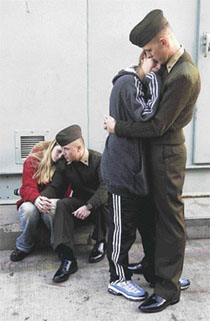 Facing war affects a nation and its people in many ways. The diverse mix of emotions, personal beliefs, and political and economic factors can seem confusing and irresolvable.
Facing war affects a nation and its people in many ways. The diverse mix of emotions, personal beliefs, and political and economic factors can seem confusing and irresolvable.
Still, it's important to take a look at how this war affects each of us, and, also, to talk about how we, as a nation, can remain strong and united through such challenging times.
For this week's lesson, you'll visit two sites about World War II. Although WWII was a very different war, these sites show how war can impact a nation and how people have coped with life during years of war.
Plus, since media coverage of the war is how most of us will "see" this military campaign, you'll check out how the American news media has reported on some major military actions over the years.
How World War II Changed Us
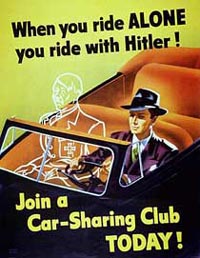 World War II was a powerful force in shaping this nation's people and future. Not only were loved ones fighting overseas, but the war prompted the country's civilians to adjust their daily lifestyles. War efforts on the home front, for example, included shortening dresses to conserve material and carpooling to conserve fuel. Basically, citizens tried to strike a balance between living life as it had been before the war and supporting the war and their troops.
World War II was a powerful force in shaping this nation's people and future. Not only were loved ones fighting overseas, but the war prompted the country's civilians to adjust their daily lifestyles. War efforts on the home front, for example, included shortening dresses to conserve material and carpooling to conserve fuel. Basically, citizens tried to strike a balance between living life as it had been before the war and supporting the war and their troops.
To get an idea of how war, in general, can affect people's lives, visit the PBS site, The Perilous Fight: America's World War II in Color. As you move through each section as outlined below, browse the pages from top to bottom and make sure to click on Letters and Color Photos within each section to get a more personalized view of the people involved in these events.
Start off your journey at The Battlefield, where you'll learn about how and why the U.S. entered this war. Also browse through the Psychology of War section. How was this war 40 years ago different from today's battles and dangers? What elements are similar? In what ways are personal connections, like letters and e-mails, between a nation's troops and civilians important?
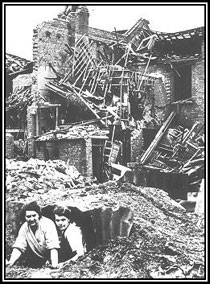 Next, explore The Home Front and Social Aspects of WWII. How did the war influence migration patterns and economic development within the country? How did the war change life for minorities? What is a "Conscientious Objector?" Did any Americans protest against the war? How did the American government and its people work through the social and economic challenges of waging war?
Next, explore The Home Front and Social Aspects of WWII. How did the war influence migration patterns and economic development within the country? How did the war change life for minorities? What is a "Conscientious Objector?" Did any Americans protest against the war? How did the American government and its people work through the social and economic challenges of waging war?
When Home Is the Battlefield
While our troops fight overseas, Homeland Security remains vigilant in protecting its citizens here. Certainly, the events of September 11, 2001 made Americans more aware that war can also be brought to their own shores.
Our allies, the British, know very well what it's like to be attacked at home. They were bombed repeatedly by the German military during WWII. Check out Civvy Street in World War 2: Tom Fletcher's true story of civilian life in wartime, and read through Tom's stories -- from the Early Days of the War to V-E Day and V-J Day. In what ways did war in their own country affect the people's daily lives? How do you think this is similar or different from what Iraqi civilians are facing? How do the experiences of the British compare and contrast with that of the Iraqis?
What types of security measures do Americans face at home today? In what ways and for what reasons are people adjusting their daily routines because of the war? What is the federal government doing that affects how we live, travel, do business, and so forth?
The Media's Viewing Scope
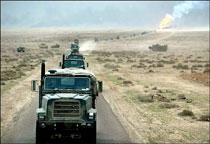 Media coverage of Operation Iraqi Freedom has introduced a new term to our wartime vocabulary: "embedded journalist." Traveling with troops and armed with laptop computers with real-time satellite uplinks, today's war reporters are on the leading edge of reality broadcasting. In fact, today's war coverage is happening so quickly and efficiently, that some people are concerned that the "Marine's-eye-view" coverage appears too much like the entertainment industry's "reality television" shows, which may send a mixed and unhealthy message to viewers.
Media coverage of Operation Iraqi Freedom has introduced a new term to our wartime vocabulary: "embedded journalist." Traveling with troops and armed with laptop computers with real-time satellite uplinks, today's war reporters are on the leading edge of reality broadcasting. In fact, today's war coverage is happening so quickly and efficiently, that some people are concerned that the "Marine's-eye-view" coverage appears too much like the entertainment industry's "reality television" shows, which may send a mixed and unhealthy message to viewers.
Regardless of those opinions, however, many Americans want and expect the media to deliver the latest news as quickly and accurately as possible. See how war reporting has evolved at the Newseum's War Stories site (Flash-enhanced and non-Flash versions). Start exploring the Media & Technology section to see how Coverage, Reporting and Technology evolved from the Civil War to the war in Bosnia/Kosovo. How did the tools of the trade help to record historic events?
What are some of the innovations evident in the current war compared to the 1991 Gulf War? In what ways do you think the coverage you view and read affects your emotions and perspective?
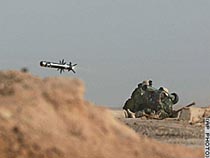 To get an idea of what wartime journalists face, browse the Essay by Harold Evans: Reporting in the Time of Conflict and check out the Video Interviews (versions for MediaPlayer, QuickTime and MP3 players are available; alternatively, follow video links to read the Caption Text). What kinds of reporting challenges have journalists faced over time and why? How did the circumstances of each war influence how the war was reported? How has covering war impacted the lives of the reporters? How may have news coverage affected the war, government officials, and public opinion?
To get an idea of what wartime journalists face, browse the Essay by Harold Evans: Reporting in the Time of Conflict and check out the Video Interviews (versions for MediaPlayer, QuickTime and MP3 players are available; alternatively, follow video links to read the Caption Text). What kinds of reporting challenges have journalists faced over time and why? How did the circumstances of each war influence how the war was reported? How has covering war impacted the lives of the reporters? How may have news coverage affected the war, government officials, and public opinion?
Think about keeping a daily or weekly journal, that could include poetry and artwork, to report your own stories related to the war. You may also want to create a news and photo scrapbook -- for yourself or for a relative or friend that's serving in the war -- to follow and memorialize what are sure to become historic events in our national and global history.
Newspaper Activities
Browse issues of Targetnewspaper to collect stories and photos related to the war with Iraq. How are people, abroad and at home, being affected by military actions or events? Are they direct or indirect impacts? How does the media's reports affect you or people you know? For example, how do they influence people's discussions, the stock market, travel plans, etc? What does the media seem to not be reporting? What types of things are people doing to help support the Operation Iraqi Freedom troops?
© Copyright 2002
Learners Online, Inc.
